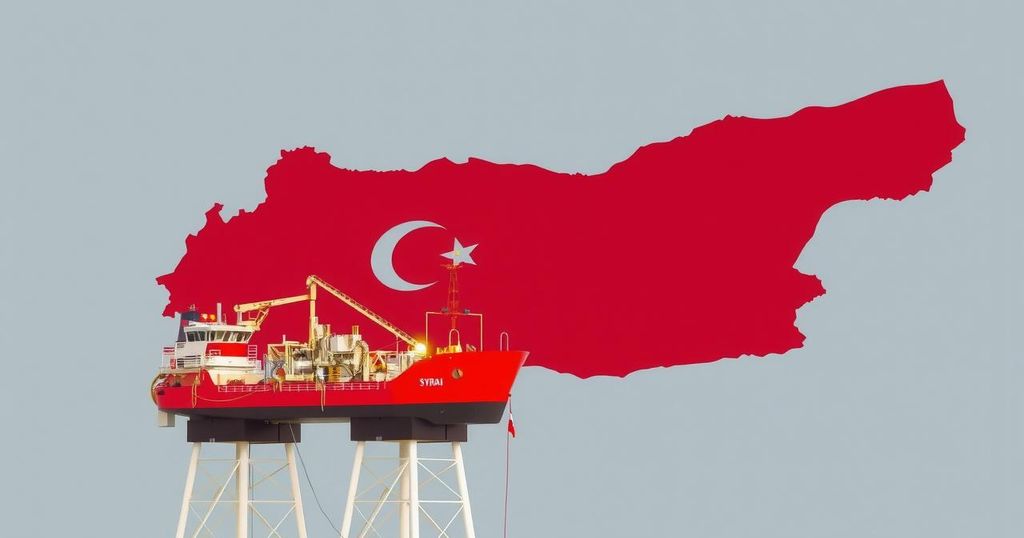Global news
AL, AL QAEDA, ALPARSLAN BAYRAKTAR, ASIA, ASSAD, BAYRAKTAR, BLOOMBERG, CONFLICT, EUROPE/ASIA, HAY ’ AT TAHRIR AL - SHAM, IRAN, IRINA SLAV, MIDDLE EAST, MIDDLE EAST AFFAIRS, REFUGEE CRISIS, RUSSIA, SANCTIONS, SYRIA, SYRIAN, SYRIAN CONFLICT, SYRIAN DEMOCRATIC FORCES, TURKEY
Fatima Khan
0 Comments
Turkey Seeks Involvement in Rebuilding Syrian Oil and Gas Production
Turkey has announced its intention to participate in reviving Syria’s oil and gas production, with plans for new pipelines and contributions to the electricity supply. The Syrian oil sector faces significant challenges due to U.S. sanctions and ongoing combat, leading to a critical shortage exacerbated by supply interruptions from Iran and Iraq. Turkey aims to work with Syria to develop its energy resources and infrastructure.
Turkey has expressed its intent to engage in revitalizing the oil and gas sectors in Syria, as reported by Bloomberg. Turkey’s Energy Minister, Alparslan Bayraktar, indicated that the country is exploring enhancements in Syria’s electricity supply, with the potential extension to oil and gas production also being considered. Bayraktar confirmed, “We plan to tell our counterparts how we can make contributions in that sense. Our objective is to develop these projects.”
Furthermore, plans are underway to establish new oil and gas pipelines linking Turkey and Syria.
Syrian oil and gas production has faced severe challenges due to U.S. sanctions and ongoing conflicts with rebel factions. Traditionally, Iran and Iraq have been Syria’s main providers of crude oil. However, a recent regime change led to the cessation of Iranian oil supplies; a tanker even turned back while en route to Syria following this upheaval. Iran previously exported around 60,000 barrels of oil daily to Syria, while Syrian production stood at approximately 80,000 barrels daily, mainly sourced from eastern regions controlled by the Kurdish-affiliated Syrian Democratic Forces.
Further complicating matters, Iraq has halted its oil deliveries to Syria since early December, as stated by an Iraqi parliamentary member. Previously, Iraq supplied about 120,000 barrels of crude daily, and this supply disruption has severely impacted Syria’s oil availability amid an even deeper crisis caused by the cessation of internal crude transfers from eastern Syria to regions controlled by Hay’at Tahrir al-Sham, a previously designated terrorist organization now seen as a significant force in the conflict.
The ongoing conflict in Syria has critically hampered the country’s oil and gas production capabilities, exacerbated by international sanctions and internal strife among various armed factions. The loss of traditional supply routes and dependencies on external sources—specifically Iran and Iraq—has posed significant challenges. The recent political shifts in Syria have worsened the situation as key suppliers have ceased operations, leading to a precarious energy landscape which Turkey seeks to address through potential cooperative projects.
In summary, Turkey’s initiative to partake in Syria’s oil and gas production comes at a pivotal time, given Syria’s current energy crisis exacerbated by external sanctions and internal turmoil. With strategic development projects and new pipeline plans, Turkey aims to stabilize and potentially revitalize Syria’s energy infrastructure. The successful implementation of these projects could significantly alter the energy dynamics in the region while assisting in Syria’s economic recovery following years of conflict.
Original Source: oilprice.com




Post Comment